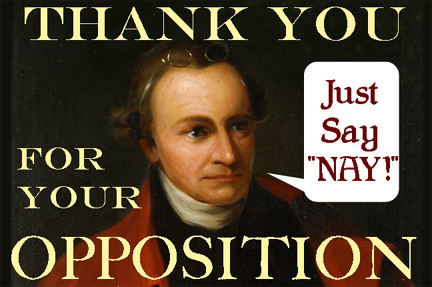| The Breed's Hill Gazette June 2009 | |
 |
|
|
Thank
You For Your…Opposition By Dan Shippey & Michael Burns
“If
our descendants be worthy the name of Americans they will preserve
and hand down to their latest posterity the transactions of the
present times; and tho I confess my exclamations are not worthy the
hearing, they will see that I have done my utmost to preserve their
liberty”
Patrick Henry
It would be
easy to think that Patrick Henry was speaking about the Revolution
in the quote above. The man who is credited with the words “Give me Most Americans today
don’t realize that a number of our famous Founders, like Patrick
Henry, had great concerns about the new Constitution. Even fewer
know that these Anti-Federalists had good reason to be afraid.
Today, when patriotic Americans revere the Constitution, it is hard
to reconcile the image of Henry the patriot with that of Henry the
Anti-Federalist. The first thing one should know about
Anti-Federalists is that they were not anti-Union or
anti-government—they were pro-union and pro-Liberty. Henry believed
that we already had a strong Republic, a confederation of equal and “A revolution as radical as that which separated
us from Henry
feared that the broad federal powers laid out in the Constitution
limited the civil liberties of individuals - many of which we take
for granted today. Henry wanted more power given to individual
states, and the civil liberties of individual citizens protected. He
feared that as time went by the government would cease in its duty
of defending our liberties, seeking only to continue and expand its
own power and wealth. Such a government he feared would become a
danger to the Republic. “This Constitution is said to
have beautiful features; but when I come to examine these features,
sir, they appear to me horribly frightful. Among other deformities,
it has an awful squinting; it squints toward monarchy, and does not
this raise indignation in the breast of every true American? Your
president may easily become king. Your Senate is so imperfectly
constructed that your dearest rights may be sacrificed to what may
be a small minority; and a very small minority may continue for ever
unchangeably this government, altho horridly defective. Where are
your checks in this government? Your strongholds will be in the
hands of your enemies. It is on a supposition that your American
governors shall be honest that all the good qualities of this
government are founded; but its defective and imperfect construction
puts it in their power to perpetrate the worst of mischiefs should
they be bad men; and, sir, would not all the world, blame our
distracted folly in resting our rights upon the contingency of our
rulers being good or bad? Show me that age and country where the
rights and liberties of the people were placed on the sole chance of
their rulers being good men without a consequent loss of liberty! I
say that the loss of that dearest privilege has ever followed, with
absolute certainty, every such mad attempt.”
|
Henry
and the other Founders had fought almost eight years for
independence from a powerful government that denied their rights,
and in his eyes this new Constitution was setting up a new powerful
government capable of doing the same.
James Madison, who was one of the great writers and supporters of
the new Constitution, attempted to persuade the Anti-Federalist.
"The
powers delegated by the proposed Constitution to the federal
government are few and defined. Those which are to remain in the
State governments are numerous and indefinite."
James Madison,
Federalist No. 45
Henry was unconvinced, but he was a wise man and a smart debater. He
and the other Anti-Federalists could see that they were losing the
fight against ratification and began pushing for a Bill Of Rights
that, while not perfecting the Constitution, would at least improve
it. Some thought a new Revolution would rise up against the
ratification of the Constitution and that Henry would be a leading
figure. He put those fears to rest in his last address at the “I beg pardon of this house for
taking up more time then came to my share, and I thank them for the
patience and polite attention with which I have been heard. If I
shall be in the minority, I shall have those painful sensations
which arise from a conviction being overpowered in a good cause. Yet
I will be a peaceable citizen. My head, my hand and my heart shall
be at liberty to retrieve the loss of liberty, and remove the
defects of that system in a constitutional way. I wish not to go to
violence, but will wait, with hopes that the spirit which
predominated in the Revolution is not yet gone, nor the cause of
those who are attached to the revolution yet lost. I shall therefore
patiently wait in expectation of seeing that government changed, so
as to be compatible with the safety, liberty and happiness of the
people.” He would remain, in the words of Richard Schumann, who portrays Patrick Henry in Williamsburg Virginia, “America’s most nervous citizen for four years,” until the bill of rights became law in 1791. The debt of thanks we owe to Henry and the other Anti-Federalists goes beyond the support they gave to the Revolution. It extends to the opposition they gave to the Constitution.
Today, Patrick Henry’s arguments seem almost prophetic. The threat
to “Guard with
jealous attention the public liberty. Suspect every one who
approaches that jewel. Unfortunately, nothing will preserve it but
downright force. Whenever you give up that force, you are inevitably
ruined.”
|